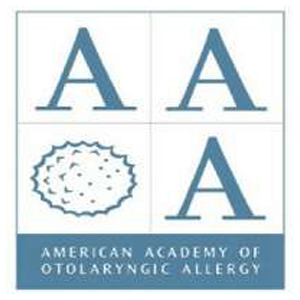AAOA-Funded Clinical Trial Examines the Effects of Radiofrequency Ablation of Posterior Nasal Nerves on Inflammatory Cytokines and Peak Nasal Inspiratory Flow
 Allergic rhinitis (AR) and non-allergic rhinitis (NAR) afflict more than 40 million people in the United States, resulting in health care expenditures of up to $1.2 billion annually and contributing significantly to morbidity. Both manifestations of chronic rhinitis have similar symptoms: sneezing, congestion, and postnasal drip. Amber Luong, MD, PhD, professor and vice chair for academic affairs in the Department of Otorhinolaryngology at McGovern Medical School at UTHealth Houston, is the faculty mentor of new study funded by the American Academy of Otolaryngic Allergy (AAOA) to compare the effectiveness of impedance-controlled radiofrequency neurolysis (RFN) in providing relief for both types of chronic rhinitis. David Allen, MD, a 3rd year otolaryngology resident, is serving as the principal investigator after being awarded the competitive grant from the AAOA to complete this study.
Allergic rhinitis (AR) and non-allergic rhinitis (NAR) afflict more than 40 million people in the United States, resulting in health care expenditures of up to $1.2 billion annually and contributing significantly to morbidity. Both manifestations of chronic rhinitis have similar symptoms: sneezing, congestion, and postnasal drip. Amber Luong, MD, PhD, professor and vice chair for academic affairs in the Department of Otorhinolaryngology at McGovern Medical School at UTHealth Houston, is the faculty mentor of new study funded by the American Academy of Otolaryngic Allergy (AAOA) to compare the effectiveness of impedance-controlled radiofrequency neurolysis (RFN) in providing relief for both types of chronic rhinitis. David Allen, MD, a 3rd year otolaryngology resident, is serving as the principal investigator after being awarded the competitive grant from the AAOA to complete this study.
“To effectively treat rhinitis, we need an accurate understanding of the disease pathophysiology,” Dr. Luong says. “Research has shown that interleukins, specifically IL-13, IL-4, and IL-5, stimulate immunoglobulin and mucus production in AR and enlist inflammatory cells such as mast cells and eosinophils. In patients with NAR, the pathology is less clear and may be associated with irregularities in nerve function.”
Standard treatment of AR includes steroid nasal sprays, saline irrigations, and topical or oral antihistamines. For patients with NAR, physicians prescribe anti-cholinergic sprays in addition to steroid or antihistamine sprays. Patients with both conditions have a high rate of persistent symptoms, treatment failure, and prolonged use of medication that force them to seek surgical interventions, such as septoplasty, turbinate reduction, vidian neurectomy, or posterior nasal nerve ablation.
“Risks are associated with these procedures,” she says. “Temperature-controlled radiofrequency ablation of the posterior nasal nerve, a safe in-office procedure, has been shown to decrease symptoms. However, to date, no objective data has been reported on the effects of radiofrequency ablation. In this study, we are investigating peak nasal inspiratory flow and type 2 interleukin changes as simple, cost-effective, and objective measures of outcomes of treatment for nasal congestion and rhinorrhea. Both measures can be performed in the office, and to our knowledge, they have not been studied as a measure of the effectiveness of posterior nasal nerve ablation.”
The study will enroll 18 patients with either AR or NAR who are candidates for RF posterior nasal nerve ablation. The researchers’ goal is to understand the effectiveness of this procedure by comparing subjective patient scores and objective measures of nasal patency and inflammation.